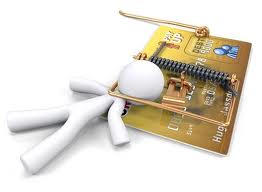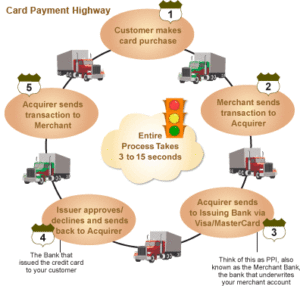Card Payment Basics
A merchant account is not to be confused with a business checking account. Since banks are card issuers, they can’t provide merchant processing services as there lays a conflict of interest. Banks collect the Interchange, so the more a company pays the more the bank / card issuer makes. When merchants say, we’re with our bank, they mean they’re with a processor their bank referred them to and are rarely aware of the behind-the-scenes referral fees or profit sharing taking place.

We have found many merchants that were paying 4% -5% rates or more, that thought they were “in good hands”.
Credit card processing fees are divided into 3 categories, and it’s important to us that our clients know where their money is going when they reconcile their statements every month. These days merchants practically need a PHD in “Reading a Merchant Statement” and find it hard to get a clear-cut answer to the fees they are charged, and why. While processors give excuses as to why they charged downgrades such as Non-Qualified, we provide solutions on how to avoid those costly downgrades before they ever happen!
These are three categories that make up the fees a merchant pays when they accept a payment by credit card, or check-card.
# 1 – The Issuing Bank Fees – This is the largest portion of the total processing fees, and it is called The Interchange portion of a merchant’s total monthly fees.
The Issuing Bank is the one that issued the credit card to the consumer, and depending on the type of card they issued there is an Interchange Fee associated based on risk. Card types can vary in Interchange fees from the lowest being a Regulated Check-Card 0.05% to the highest being a Commercial Standard Card at 3.17%. The Interchange can also be affected by the industry type, whether it is a card-present, or card-not-present transaction, and most importantly and more often than none, the amount of data that is being sent to the card issuing bank about the transaction.
Card Group passes the interchange through to merchants at actual cost, where other processors take the liberty to “pad” or “surcharge” the interchange making it very difficult for merchants to identify what the actual cost was Vs. what they ended up paying for the transaction.
For example, Square charges 2.75% for a regulated Debit Card that has a small Interchange cost of 0.05% & $0.22
Another example of “padded” rates is QuickBooks, who will charge you 3.50% or more for a regulated Debit Card that has a small Interchange cost of 0.05% & $0.22
# 2 – The Card Association Fees –

This is one of the biggest miss-understood fees in our industry. The associations are Visa, MasterCard, Discover, and American Express. There are a lot of merchants that think that the associations are the one’s making all the profits, when it’s not true since the Issuing Banks are the ones that take on the biggest risk and thus collect the largest of the fees known as the Interchange.
The Association Fees are set in stone, and are changed during the Spring, and Fall changes that happen every April and October. Currently, Visa’s Assessment is 0.12% + an APF fee of 0.0195 for credit and $0.0155 for debit. MasterCard’s Assessment is 0.12% + 0.02% for >$1,000 transaction+ a NABU fee of $0.0195. Discover’s Assessment is 0.13% + a network fee of $0.0195.
The Association fees are passed through to the merchant at true-cost.
It is uncommon for a processor to “pad” the association fees, but since there is no real regulation in our industry there are plenty of unethical processors out there that do.
#3 – The Processor Fees – Finally is the Processors Fees. These fees are also based on risk. While the Issuing Banks takes the risk on the card-holders end not honoring their promise to pay, Processors are exposed to merchants not paying their fees, and can get stuck holding the bag for 100’s of thousands of dollars if a company goes upside down and can’t deliver the goods/services a consumer paid for with their credit card. Processor fees are generally comprised of a Discount rate, and a Per-Transaction fee. There are also other fees that make up the processor fees such as a chargeback fee, batch fees, monthly statement fee, etc.
Card Group International is dedicated to educating merchants about the card payment industry, building lasting relationships and improving merchant’s bottom line.
We believe that merchants shouldn’t have to change merchant processors every couple year’s because their fees are too high, or someone is offering a better solution or service.
When you switch to us you will understand what you pay, where the fees you’re paying are going, and you will receive a transparent statement with all the rates fully disclosed.
Experience
We have the experience, and the know-how to not just save companies money, but find a solution that simplifies and makes their payment processing the least expensive and the most efficient. We make sure we are always up-to-date with new programs and guidelines that ensure our clients payment processing run smooth, and protect their bottom line.
Trust
We build trust from day one by performing an audit of the last 3 months processing statement, understanding what a merchant’s needs are, and filling the voids they currently have with their processors, whether its service, solutions or savings we listen to what our clients need, and we make it work.
We can save a company thousand to millions of dollars annually. Most processors focus on saving merchant’s money by reducing the processor fees, where we’ve learned through our years and hundreds of merchants account analysis that the biggest savings have often been found padded inside the Interchange, or the merchant could have been paying less in Interchange fees by passing more data to the issuing banks or using a different method of processing that best fit their business model and industry.
We provide every merchant with straight pass-through pricing which is the same pricing that large retailers like Walmart, Starbucks or Big-Box retailers receive. This means that every card type is passed-through at the issuing bank interchange rate.
Keep in mind, that just because a merchant is on interchange pass-through there are different Merchant Category Codes, Levels, and Programs that dictate which interchange category the card being process will qualify under. One card to make an example of is the Purchasing Card used by large corporations and state/government agencies. The Purchasing Card can show up on a merchant’s interchange report / statement as 7 different rates ranging from 1.45% to 2.95%.
So straight interchange pass-through does not always mean a merchant already has the best rates, all it means is that there is not padding of the interchange taking place by the processor… there might still be 10’s of thousands of annual savings if the interchange qualifications are “optimized” to the best possible rates.
It all comes down to understanding how the merchant processes their transactions and focusing on interchange optimization, so they always qualify at the best possible rates. It is our job to look after our merchants processing fees, and it’s what sets us apart from our competition.
We can help merchants in just about every industry, from mom and pop shops to multi-location franchises and billion-dollar companies. We provide cost saving solutions and build long lasting relationships.
Let us improve Your Bottom-Line!

In today’s marketplace, merchants are faced with a complex set of terminology and conflicting information when they look to set-up their payment processing options.
From the most complex integrated solution to a standalone POS terminal, all card payments follow the same simple steps.
How a Payment Card Transaction Works:

# 1 – A cardholder purchases goods or services from a merchant.
# 2 – The merchant sends the transaction information to an Acquirer (Merchant Bank) and is reimbursed for the sale less a discount rate.
# 3 – The Acquirer submits the transaction to the Issuing Bank for payment by either the MasterCard or Visa settlement system.
# 4 – The Issuer pays the Acquirer for the purchase through the settlement system.
# 5 – The cardholder repays the Issuer for the goods and services originally purchased from the merchant.
Merchants, large and small, established and brand new, benefit from accepting payments cards and telling their customers about it:
Increased Sales – Customers spend more when they have options besides cash. An old truism says that “the more ways you give a customer to pay, the more money you make.” Customers paying with payment cards typically spend more. And the cost of accepting card payments is paid for and increases profit by the increase in gross sales. In other words, your business will enjoy higher average tickets and additional purchases that might not otherwise have been made.
Customer Satisfaction – Today’s customers demand the flexibility to pay
- How
- Where
- When they want
Electronics transactions save you time and money by
- Automating manual store procedures
- Speeding checkout lines
- Providing better customer service
- Increasing cash flow
- Offering higher profits
Whether it’s by debit or credit card or a specialty product, satisfied customers will be loyal customers.
